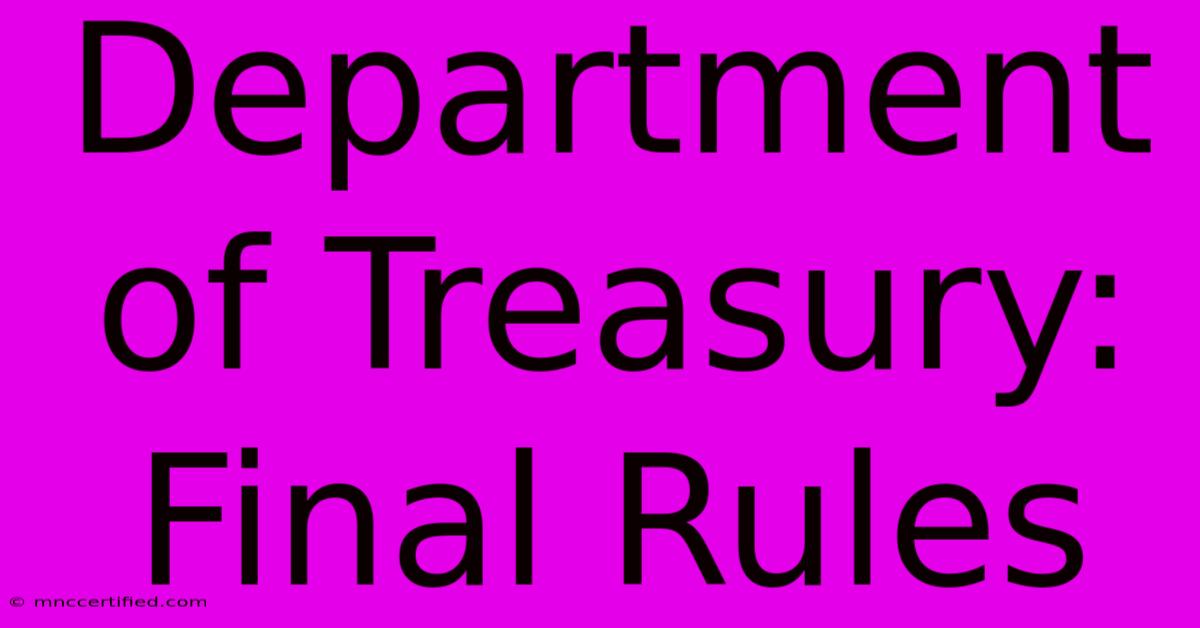Department Of Treasury: Final Rules

Table of Contents
Department of Treasury: Final Rules – A Comprehensive Overview
The Department of the Treasury (Treasury Department) frequently releases final rules impacting various sectors of the U.S. economy. Understanding these rules is crucial for businesses, individuals, and financial institutions to ensure compliance and navigate the evolving regulatory landscape. This article provides a comprehensive overview of how to find, understand, and comply with these vital regulations.
Understanding the Importance of Treasury Department Final Rules
The Treasury Department plays a significant role in shaping the financial health and stability of the United States. Its final rules cover a wide range of areas, including:
- Taxation: Rules governing individual and corporate income taxes, estate taxes, excise taxes, and international taxation. Changes here can significantly impact financial planning and business operations.
- Financial Regulation: Rules impacting banks, credit unions, investment firms, and other financial institutions. These rules often aim to protect consumers and maintain the stability of the financial system.
- Economic Policy: Rules related to sanctions, international finance, and economic development initiatives. These rules can impact global trade and investment.
- Debt Management: Rules pertaining to the issuance and management of U.S. Treasury securities. This directly impacts the national debt and borrowing costs.
Staying informed about these final rules is not merely a matter of compliance; it's a strategic necessity. Failure to comply can result in significant financial penalties, legal ramifications, and reputational damage.
Locating Treasury Department Final Rules
Finding the relevant final rules requires a systematic approach. Here's where you can look:
- Federal Register: The official daily publication for proposed and final rules from all federal agencies, including the Treasury Department. Searching the Federal Register archives is crucial for accessing past regulations. This is the primary source for all official Treasury Department final rules.
- Treasury Department Website: The official Treasury website provides access to press releases, news, and often links directly to relevant final rules published in the Federal Register. Look for sections dedicated to specific bureaus (e.g., IRS, Financial Crimes Enforcement Network (FinCEN)).
- Government Publishing Office (GPO): The GPO provides access to official government publications, including the Federal Register. They offer a searchable database and various subscription options.
- Legal Databases (Westlaw, LexisNexis): These commercial databases provide comprehensive legal research tools, including access to the Federal Register and other relevant legal materials. These databases often offer advanced search functionalities and expert analysis.
Pro-Tip: Use specific keywords when searching for final rules. For example, instead of searching for "Treasury rules," try "Treasury Department final rules on cryptocurrency" or "IRS final rules on tax deductions."
Interpreting and Applying Treasury Department Final Rules
Once you've located the relevant final rules, understanding and implementing them is crucial. These rules are often complex and legally dense.
- Read Carefully: Thoroughly review the entire document, paying close attention to the definitions, effective dates, and specific requirements.
- Seek Professional Advice: For complex regulations, consulting with legal or financial professionals is highly recommended. They can provide expert interpretation and guidance on compliance.
- Stay Updated: Regulations frequently change. Regularly monitor the Federal Register and the Treasury Department's website for updates and amendments.
Key Considerations for Compliance
- Effective Dates: Pay close attention to the effective date of the final rule. Non-compliance after the effective date can lead to penalties.
- Transition Periods: Some final rules include transition periods to allow businesses and individuals time to adjust to the new requirements. Familiarize yourself with these transition periods.
- Record Keeping: Maintain thorough records to demonstrate compliance with the final rules. This is especially critical for tax-related regulations.
Conclusion
Navigating the world of Treasury Department final rules requires diligence, attention to detail, and often, professional assistance. By utilizing the resources and strategies outlined above, businesses and individuals can ensure compliance, minimize risk, and effectively manage their financial affairs within the framework of these essential regulations. Remember to regularly monitor updates and seek expert advice when needed. Staying informed is key to success in this constantly evolving regulatory landscape.

Thank you for visiting our website wich cover about Department Of Treasury: Final Rules. We hope the information provided has been useful to you. Feel free to contact us if you have any questions or need further assistance. See you next time and dont miss to bookmark.
Featured Posts
-
Open Ai Chat Gpt Outage Whats Happening
Dec 28, 2024
-
Irs Finalizes De Fi Broker Reporting
Dec 28, 2024
-
Inarritus Batman Sequel 2027 Release
Dec 28, 2024
-
Mc Carthy On Cowboys Offensive Struggle
Dec 28, 2024
-
Arsenal Ipswich Live Premier League Score
Dec 28, 2024